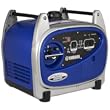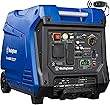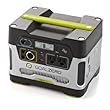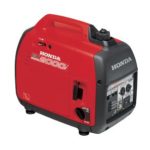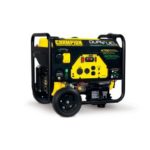If you’ve been stuck in a power outage for a long period, you probably realize how useful and valuable a portable generator can be. A portable generator can mean the difference between comfort and disaster and is easy to transport and great for areas without access to conventional power sources.
There are a lot of models to choose from, and here in our handy guide, we cover all of the basics. We’re here to help you choose the best portable generator to meet your individual needs.
Things to Consider When Choosing the Best Portable Generator
- Portable generators provide adequate power to small appliances during prolonged power outages. They are also great for camping, tailgating, and limited power tool use on construction job sites. However, they are not strong enough for the heavy drain of larger appliances like central air conditioning. A larger generator should be considered to run full, draining electrical loads.
. - Portable generators require large amounts of gasoline, propane, or diesel, extremely flammable and hazardous fuels. It is important to handle the fuel for your portable generator with care and follow all manufacturers’ safety instructions.
. - If you plan to transport your generator regularly, it is important to consider weight and dimensions before making your decision. Smaller, lighter models are good options for tailgating, camping, and other travel-related activities.
Top 10 Portable Generators Comparison Table
Tips for Buying a Portable Generator
Don’t purchase your portable generator without first reading the information in this section.
- Fuel. Traditional electrical generators take the energy stored in fossil fuels, such as propane, gasoline, or diesel, and convert it into mechanical energy. However, some more modern generators use power sources like car batteries or solar panels.
. - Electrical Load. It is important to consider the electrical load your portable generator will need to support. This will require a little bit of basic math. You will need to add the wattage requirements for the appliances or tools you wish to power and match your needs with a generator’s wattage output.
The greater the generator’s wattage, the more power it generates. It is also important to remember that the higher the generator’s wattage output, the more fuel it will require to run effectively and efficiently.
- Wheels. Don’t forget that transporting a heavy unit like this is much easier if you can wheel it around rather than carry it.
This isn’t a crucial feature, but it is one to consider as you compare and contrast all models.
Top 3 Best Portable Generator Reviews
1. Honda EU2200iTAG 2200-Watt 120-Volt Super Quiet Portable Inverter Generator

The Honda Generator runs so quietly that you’ll forget it’s even running. You’ll be able to carry on a conversation, listen to music, or hear the television without even turning up the volume.
Despite its whisper-quiet motor, it is still powerful enough to run most of your household essentials, including lights, refrigerator, and television.
Lightweight for easy portability, the Honda Generator is a great option for use as emergency backup power or camping and tailgating. You’ll love how this generator powers up easily, often on the first pull.
Its durability, dependability, and easy serviceability make this the best portable generator on the market today.
2. WEN 56475 4750-Watt Portable Generator

The WEN 56475 Portable Generator is just the insurance you need for natural disasters and power outages. Its dependability and rugged power are enough to provide peace of mind in several situations.
It is strong enough to power household essentials, your RV campsite, or even a small backyard workshop.
It starts immediately out of the box, usually on the first or second pull. Lightweight and quiet, the WEN 56475 Portable Generator is everything you want in a portable generator. You can’t go wrong with this one.
3. Champion Power Dual Fuel RV Ready
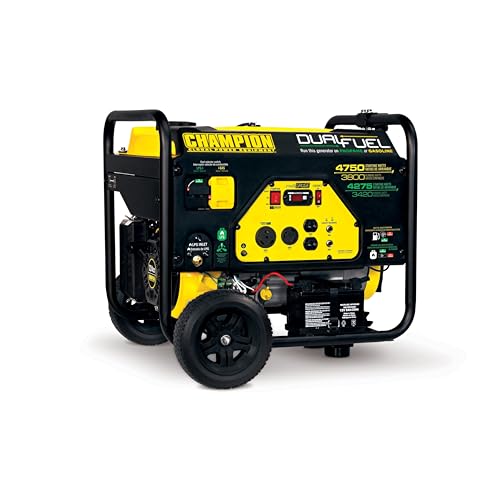
Conveniently running on gasoline or propane and starting up with just the push of a button, this Champion Portable Generator is ready to run straight out of the box. It runs great in cold and hot weather, making it very convenient for midwinter, and freezing temperature power outages.
It runs smoothly even with extended use. It comes ready to hit the road with a standard 30A RV outlet, making it a great choice for camping or cross-country travel.
Strong enough to power all of your essentials and durable enough to stand up to harsh weather conditions, the Champion Power Equipment Dual Fuel Portable Generator is a great investment.
Frequently Asked Questions
What Is A Good Size Portable Generator For A House?
A portable generator is a great way to have power during a blackout or other emergency. But what is the best size for a house? A good rule of thumb is to choose a generator rated at 5,000 to 7,500 watts. With this power, you can run even the most critical household equipment, including the refrigerator, freezer, well pump, and lighting circuits.
A 7500-running-watt generator can even run all of these appliances at once. So if you are looking for a generator that will provide you with the power you need in an emergency, make sure to choose one that is at least 5,000 watts.
How Do You Plug A Generator Into Your House?
It would be best if you first had a generator to plug a generator into your house. Once you have obtained a generator, plug the gen cord into the 20- or 30-amp outlet on your generator. The other side of the cord will have several outlets for different appliances. You can then start connecting extension cords to those outlets, which will be safe to use indoors.
It is important to note that you should never overload your generator; otherwise, you risk damaging your generator or overloading your circuit breaker. Also, always keep your generator well-ventilated to avoid carbon monoxide poisoning. Following these simple steps, you can easily and safely plug a generator into your house.
How Many Watts Do I Need To Power My House?
The answer to this question depends on several factors, including the size of your home and the number of appliances you use. However, as a general rule of thumb, you will need between 2,000 and 3,000 watts to power your home if you have the basics, such as a refrigerator and a water heater.
If you have additional appliances, such as a washing machine or an air conditioner, you will need to add to this number. In addition, if you live in an area with frequent power outages, you may want to consider investing in a backup generator. This will ensure you have enough power to keep your home running during an outage.
Can You Plug Generator Into Wall Outlet?
A generator should not be plugged into a wall socket for several reasons. Firstly, it is illegal in some areas to do so. Secondly, even if it is legal, there is a risk of permanent damage to the home’s electrical system through backfeeding. Backfeeding occurs when the generator is connected to the main power supply and starts supplying power to the grid.
This can cause a fire if the grid is already overloaded. Thirdly, the voltage from a generator is not regulated and can fluctuate widely. This can damage appliances that are plugged into the wall socket. Finally, wall sockets are not designed to handle a generator’s high current. For all these reasons, it is best to avoid plugging a generator into a wall socket.
Can You Plug A Generator Into Dryer Outlet?
A generator is a great way to provide power during an outage, but it’s important to ensure that it’s used safely. One of the most important safety considerations is ensuring the generator is properly disconnected from the power grid before it’s started.
Otherwise, the generator could feed power back onto the grid, which could be dangerous for utility workers trying to repair downed lines. A transfer switch and interlock mechanism can help ensure that the generator is properly disconnected before it’s started. This investment can help keep you and your loved ones safe during an outage.
Conclusion
When the power goes out, you need a portable generator that you can rely on. Whether you are looking for a generator to power your home during an outage or one to take with you camping, make sure to choose one that is durable and powerful. The WEN 56475 Portable Generator and the Champion Power Equipment Dual Fuel Portable Generator are both great options. With either one, you will have the power you need when you need it.







